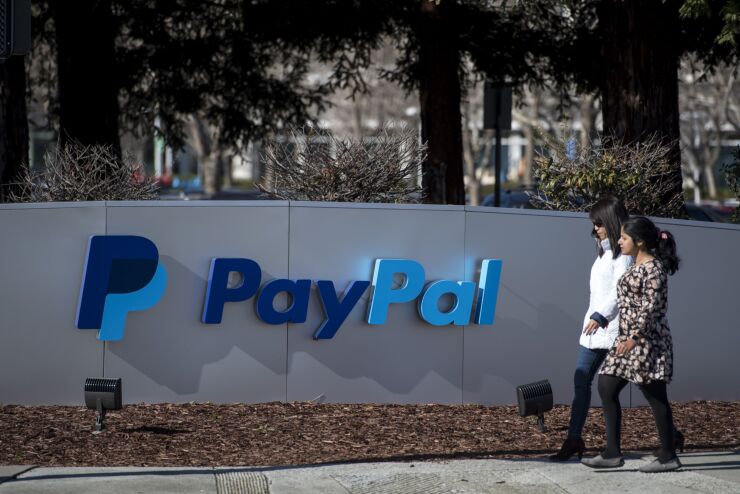PayPal isn’t the first company to open its platform to cryptocurrencies, but in its technique it is more hands-on than most payment providers.
Unlike certain other payment networks working with third parties to enable cryptocurrency transactions, PayPal users will be able to buy, hold, sell and make purchases at 26 million merchants with cryptocurrencies directly from their PayPal account, the San Jose-based company announced on Wednesday.
PayPal also said it has obtained a conditional Bitlicense from the New York State Department of Financial Services, which could open additional doors for PayPal.
The conditional Bitlicense allows companies like PayPal to partner with already licensed companies — Paxos in this case — to bring services to market more quickly, a PayPal spokesperson said by email. PayPal is the first to get a conditional Bitlicense, which the New York agency announced in June as a way to encourage new entrants into the virtual currency market. Other companies have received a traditional virtual currency and money transmitter
Visa and Mastercard earlier this year announced platforms to back cryptocurrency payment cards, and bitcoin investment has been a bright spot for Square's revenue in recent quarters via Square’s
A key difference, however, between the third-party cryptocurrency cards Mastercard is supporting and PayPal’s approach is who’s holding the cryptocurrencies, said Eric Grover, a principal with Intrepid Ventures.

“A Mastercard licensee will hold cryptocurrencies on behalf of consumers and issue Mastercard payment products. PayPal is a network but also an issuer. It will hold cryptocurrencies on behalf of PayPal users,” Grover said.
And even with all of this other activity from major payment networks, PayPal’s move to enable cryptocurrency transactions is a significant turning point for crypto to finally begin to leave the shadows and go mainstream, according to Douglas Borthwick, chief marketing officer at INX Ltd., a Washington, D.C.-based blockchain trading platform for digital securities and cryptocurrencies.
“PayPal, with 300 million users, can be the bridge from traditional payments to cryptocurrencies by telling users ‘Here’s an easy way to get into cryptocurrency; we can onboard you,’ ” Borthwick said.
Venmo will add the same capabilities in the first half of 2021, with support for bitcoin, Ethereum, Bitcoin Cash and Litecoin as the first cryptocurrencies supported on both platforms, PayPal said in a press release.
Fees for buying and selling crypto begin Dec. 31, 2020, PayPal said.
PayPal in recent months
Square earlier this month sank $50 million into bitcoin purchases, a few weeks after MicroStrategy put all of its $425 million in cash reserves into bitcoin, which it sees as a secure hedge against volatility.
Visa in June laid out its
In August, Wirex launched a
Mastercard has emphasized that it’s not actually supporting cryptocurrencies within its network; instead, any conversion that happens during transactions is under individual wallet providers’ guidelines.
PayPal also has set up some limitations for cryptocurrency users on its platform.
“You can only hold the cryptocurrency that you buy on PayPal in your account … the cryptocurrency in your account cannot be transferred to other accounts on or off PayPal,” it said in its FAQs about the new service, according to a Coindesk report.
PayPal cited the pandemic as one reason it accelerated plans to support cryptocurrency.
“The shift to digital forms of currencies is inevitable, bringing with it clear advantages in terms of financial inclusion and access; efficiency, speed and resilience of the payments system; and the ability for governments to disburse funds to citizens quickly,” Dan Schulman, PayPal’s president and CEO, said in the release.





